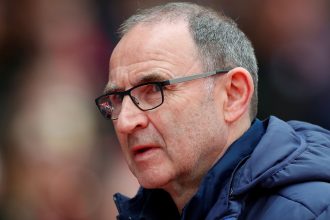With Pep Guardiola's great Manchester City side unravelling, GOAL looks back at the demise of other era-defining teams and coaches
It felt like we were watching the end of an era at the Santiago Bernabeu on Wednesday night as a once-mighty Manchester City were completely outplayed by Real Madrid in the shockingly one-sided second leg of their Champions League play-off – and Pep Guardiola concurred.
"Nothing is eternal," the Catalan coach acknowledged after his team's 6-3 aggregate defeat. "We have been extraordinarily extraordinary in the past, but not anymore." Indeed, City are no longer one of the dominant forces in football – and what's shocking about their decline is how sudden it has been. They've gone from a fourth consecutive Premier League title to fighting for fourth place in less than a year.
However, if history has taught us anything it's that all great reigns must come to an end. Sometimes, it's a long, painfully protracted process; on other occasions, it seems to happen almost overnight. But there's always a moment, a match, a move or a managerial change that signals the loss of something that can never be replaced. Below, GOAL runs through some of the most dramatic falls from grace in football…
AFPArsene Wenger's Arsenal
It was seriously sad to see an Arsenal follower holding a sign that read "Enough is enough!" during his side's Premier League clash with Chelsea at Stamford Bridge just a month into the 2017-18 season.
The public display of dissatisfaction with Arsene Wenger was lamentable enough, given the Frenchman was the tactical mastermind behind 'The Invincibles' – the thrilling history-making team that won the title in 2004 without losing a single game. But what was particularly depressing was the realisation that the supporter could bring that placard to the ground safe in the knowledge that Arsenal would fail to win – and that his fellow fans would share the sentiment.
Wenger had signed a two-year contract extension after lifting his seventh FA Cup just four months previously but that surprise Wembley win over Chelsea did little to quell the sense of frustration that had been building at the Emirates, where there was no longer any real faith in Wenger's ability to lead the club to another Premier League title.
They were probably right, in fairness. Wenger and Arsenal had arguably never really been the same following David Dein's acrimonious exit in 2007 and the Gunners finished sixth at the end of 2017-18 campaign punctuated by constant cries from the crowd of 'Wenger out!'.
However, the man who undeniably changed English football for the better after his arrival in 1996 later admitted that he was bitterly upset by the fact that he was forced out with a year still left to run on his contract.
"The hostility of a section of the fans and the board was unjustified," he said in an interview with in 2020. "I felt as if I’d built the training centre and the stadium myself brick by brick… It was very hard, very brutal. Arsenal was a matter of life and death to me, and without it there were some very lonely, very painful moments."
AdvertisementHulton Archive'Boot-room' Liverpool
Liverpool were the dominant force in English football for nearly two decades. Between 1973 and 1990, the Reds won 11 First Division titles, four European Cups and two UEFA Cups. Because of the 'Boot Room' culture implemented by legendary manager Bill Shankly, Liverpool's glorious period of sustained success looked like continuing indefinitely.
However, on the night of February 22, 1991, Kenny Dalglish realised during the closing stages of a pulsating FA Cup clash with Everton he could no longer continue as manager. Liverpool had just taken the lead for the fourth time at Goodison when the Scot found himself paralysed by anxiety.
"I was standing on the touchline and I knew that I had to make a change to shore things up at the back," he subsequently explained. "I could see what had to be done and what would happen if I didn't do it, but I didn't act on what I knew I had to do. That was the moment I knew."
Dalglish's resignation two days later stunned the world of English football. After all, Liverpool were top of the league at the time and still had a home replay against Everton to come. There were all sorts of rumours as to why Dalglish was quitting but the truth was that he was emotionally exhausted. As so many of his former players later revealed, the Hillsborough disaster on April 15, 1989 had a profound effect on Dalglish, who had attended the funeral of every one of the victims (including four in one day).
"He just couldn't go on doing the job," his daughter Kelly later revealed. "All the emotion and stress of Hillsborough, all the weight of responsibility he felt, had taken its toll. Hillsborough was devastating for dad."
Liverpool turned to another former icon to take over from Dalglish but Graeme Souness was not from the same cloth as his fellow Scot and the 'Boot Room' was literally dismantled during his terrible tenure, which was also marred by a horribly ill-advised interview Souness did with the newspaper responsible for publishing a series of lies about the Hillsborough disaster.
It would take Liverpool years to recover from Souness' spell in charge, and exactly three decades for Liverpool to win another league title.
Getty Images SportJohan Cruyff's 'Dream Team'
Johan Cruyff was a cocky character – and with good cause. He remains the most influential figure in football history, having played a pivotal role in revolutionising the game, first as a player and then as a coach. His footballing philosophy spawned a succession of top tacticians.
So, it was by no means surprising to see him talk up his brilliant Barcelona side ahead of the 1994 Champions League final against AC Milan.
After all, Cruyff's famed 'Dream Team' had won the title just two years previously and were also on a run of four consecutive Liga titles.
"We're the favourites," the Blaugrana boss said ahead of the showdown with Milan in Athens. "We're more complete, competitive and experienced than [in the 1992 final against Sampdoria] at Wembley. Milan are nothing out of this world. They base their game on defence; we base ours on attack."
Cruyff even told his players before the final, "You're better than them, you're going to win." They didn't, though. Barca weren't just beaten in the final, they were battered, losing 4-0 to a Dejan Savicevic-inspired Milan, and Cruyff's shell-shocked side never recovered.
After lifting 11 trophies in the preceding five years, Barca failed to win another before Cruyff was unceremoniously sacked in 1996, with the club icon told "You no longer belong here" during a heated argument with vice-president Joan Gaspart that allegedly turned into a physical confrontation.
Nobody would have thought it at the time but that humbling defeat in Greece signalled the beginning of the end of Cruyff's reign in Catalunya and it was only when one of the Dutchman's disciples, Pep Guardiola, took over in 2008 that Barca’s old identity was restored.
Getty Images SportLionel Messi's Barcelona
Barcelona 2-8 Bayern Munich – it's one of the most infamous results in football history, a humiliation of such epic proportions that it's often cited as the reason why Lionel Messi decided he wanted to leave Barcelona.
In truth, though, the Argentine knew that Josep Maria Bartomeu's Blaugrana were broken long before they were embarrassed in front of the watching world in a Champions League quarter-final in Lisbon.
As Messi admitted in his exclusive interview with GOAL in September, 2020, "The truth is that there has been no project or anything for a long time."
Just five years before, Barca had won their sixth Champions League trophy in Berlin with arguably the finest attacking triumvirate of all time: Messi, Luis Suarez and Neymar. At the time, they looked unstoppable, but Bartomeu didn't just fail to build on the treble triumph, he destroyed the foundations upon which it had been constructed with one disastrous signing after another.
Consequently, Messi, the key protagonist in Barca becoming the biggest club in the world, was fed up long before the Bayern debacle and although he reluctantly agreed to see out the final year of his contract, he left on a free transfer the following year as much for the cash-strapped Catalans as himself.
Bartomeu may have been forced to resign as president in disgrace in October 2020 but his departure didn't resolve the club's colossal financial problems. He had effectively left Barca on the verge of bankruptcy, which made Messi's belated exit inevitable.
Barca have since re-established themselves as a force in La Liga and the Champions League but the financial effects of Bartomeu's recklessness are still being felt today, while it also remains a crying shame that the club completely wasted Messi's final few years at the side he’d represented since he was teenager.
The GOAT's historic spell at Camp Nou should have ended in tears of joy – rather than sadness.






